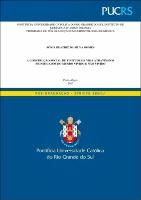| Compartilhe o registro |


|
Use este identificador para citar ou linkar para este item:
https://tede2.pucrs.br/tede2/handle/tede/7622| Tipo do documento: | Tese |
| Título: | A construção social de finitude da vida através dos significados do mundo vivido e não vivido |
| Autor: | Gomes, Sonia Beatriz da Silva  |
| Primeiro orientador: | Myskiw, Jociane De Carvalho |
| Primeiro coorientador: | Kern, Francisco Arseli |
| Resumo: | O século XXI reserva uma mudança no perfil populacional mundial, teremos cada vez mais pessoas com idade superior aos 60 anos de idade, as proporções da população “mais idosa”, ou seja, de mais de 80 anos da população brasileira, também está aumentando. Este contingente “mais idoso” necessita, diariamente, de cuidados e auxílio para realizarem as atividades de vida diária – AVDs. Fazem parte desta população longeva, religiosos consagrados que dedicaram sua vida a Deus a partir de uma congregação religiosa e, assim, dependem da estrutura da congregação para viver este período do Ciclo Vital, descrito como finitude. O objetivo geral desta investigação foi compreender a construção social de finitude de vida através dos significados do mundo vivido e não vivido pelos Irmãos Maristas na perspectiva do entendimento da fase de finitude do ciclo vital, a partir da construção, a posteriori, de categorias emergentes do processo articuladas com os grandes temas da formação da Vida Consagrada: Comunhão com a Natureza, Comunhão com os outros, Comunhão consigo mesmo e Comunhão com Deus. A abordagem desta investigação é qualitativa, e segue a técnica etnográfica, baseada nos registros sistematizados a partir dos diários de campo, entrevista etnográfica, fotos e filmagens realizados no período de setembro de 2012 a dezembro de 2013, do Projeto desenvolvido pela Pró-Reitoria de Extensão – PROEX/PUCRS, para os moradores da Casa São José de Viamão. A pesquisa tomou como referência o método de análise a Fenomenologia Transcendental de Husserl, que pode estar voltada para a compreensão do processo de construção social do mundo vivido e não vivido pelos Irmãos Maristas, caracterizando-o como um projeto interdisciplinar. Participaram do estudo 13 Irmãos Maristas, com idade entre 76 e 94 anos, e 50 e 74 anos de Vida consagrada. A análise dos registros etnográficos indicou que os aspectos biológicos, psicológicos e sociais deste período de vida descrito como finitude dos participantes, retrata os significados da vida construída a partir dos valores Maristas, e são superados, em especial, pela constituição e preservação da Fé vivida, permeado pelas vicissitudes do processo de envelhecimento. |
| Abstract: | The 21st century reserves a change in the world population profile, we will have more people over 60 years of age, the proportion of the population "older", that is, more than 80 years of the Brazilian population, is also increasing. This "older" contingent needs, daily, care and assistance to carry out the activities of daily living - ADLs. Part of this long-lived population are consecrated religious who dedicated their lives to God from a religious congregation and thus depend on the structure of the congregation to live this period of the Life Cycle described as finitude. The general objective of this research was to understand the social construction of finitude of life through the meanings of the world lived and not lived by the Marist Brothers in the perspective of understanding the finite phase of the life cycle, starting from the construction, a posteriori, of emerging categories of the Process articulated with the great themes of the formation of consecrated life: Communion with Nature, Communion with others, Communion with oneself and Communion with God. The approach of this research is qualitative, and it follows the ethnographic technique, based on the records systematized from the field journals, ethnographic interview, photos and filming performed from September 2012 to December 2013, of the Project developed by the Pro-Rectory of Extension - PROEX / PUCRS, for the residents of Casa São José de Viamão. The research took as reference the method of analysis of Husserl's Transcendental Phenomenology, which may be aimed at understanding the process of social construction of the world lived and not lived by the Marist Brothers, characterizing it as an interdisciplinary project. The study included 13 Marist Brothers, aged between 76 and 94, and 50 and 74 years of Consecrated Life. The analysis of ethnographic records indicated that the biological, psychological and social aspects of this period of life described as finitude of the participants portray the meanings of life constructed from Marist values, and are overcome in particular by the constitution and preservation of Faith lived , Permeated by the vicissitudes of the aging process. |
| Palavras-chave: | Finitude Construção Social Maristas |
| Área(s) do CNPq: | CIENCIAS DA SAUDE::MEDICINA |
| Idioma: | por |
| País: | Brasil |
| Instituição: | Pontifícia Universidade Católica do Rio Grande do Sul |
| Sigla da instituição: | PUCRS |
| Departamento: | Instituto de Geriatria e Gerontologia |
| Programa: | Programa de Pós-Graduação em Gerontologia Biomédica |
| Tipo de acesso: | Acesso Aberto |
| Restrição de acesso: | Trabalho será publicado como artigo ou livro |
| Prazo para liberar texto completo: | 12 meses |
| Data para liberar texto completo: | 21/08/2018 |
| URI: | http://tede2.pucrs.br/tede2/handle/tede/7622 |
| Data de defesa: | 26-Mai-2017 |
| Aparece nas coleções: | Programa de Pós-Graduação em Gerontologia Biomédica |
Arquivos associados a este item:
| Arquivo | Descrição | Tamanho | Formato | |
|---|---|---|---|---|
| TES_SONIA_BEATRIZ_DA_SILVA_GOMES_COMPLETO.pdf | SONIA_BEATRIZ_DA_SILVA_GOMES_TES | 2,01 MB | Adobe PDF |  Baixar/Abrir Pré-Visualizar |
Os itens no repositório estão protegidos por copyright, com todos os direitos reservados, salvo quando é indicado o contrário.




